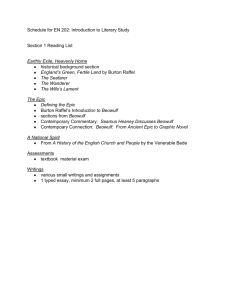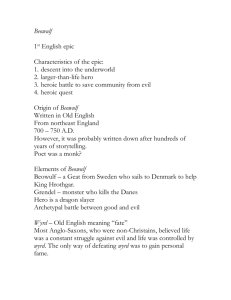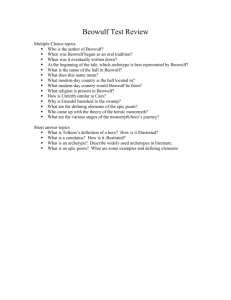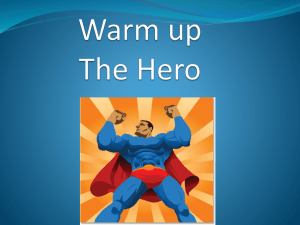Beowulf Packet - Arrowhead High School
advertisement
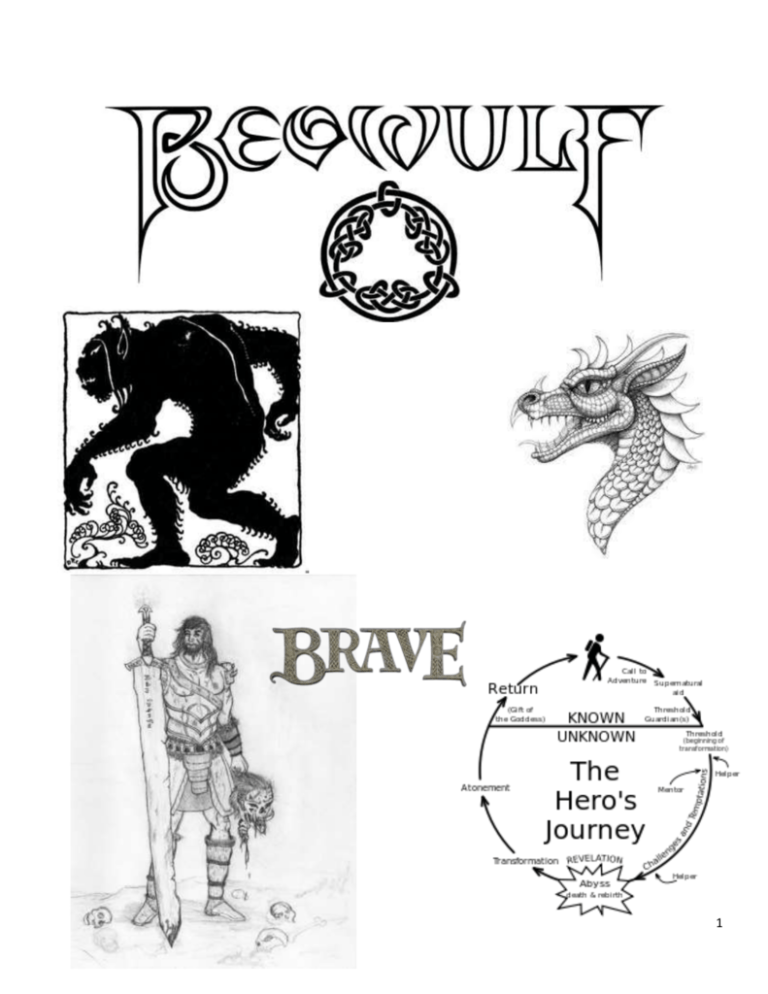
1
Beowulf
Beowulf is to England what Homer’s Iliad and Odyssey are to ancient Greece. It is the first great work of
a national literature. It is the mythical and literary record of a formative stage of English civilization—an
epic of heroic sources of English culture. Beowulf is oral art, handed down, with changes and
embellishments, from one minstrel (scop) to another. Beowulf was composed in Old English c. 650 –
750; however, the world it depicts is much older.
The only manuscript of Beowulf dates from 1000 and is housed in the British Museum in London. It was
discovered in the 18th century, having survived Henry VIII’s destruction of the monasteries 200 years
earlier.
EPIC:
--long, narrative poem that deals with themes and characters of heroic
proportions
--hero is of noble birth or high position and often of great historical or legendary
importance
--hero’s character traits reflect important ideals of his society
--hero performs courageous—sometimes superhuman—deeds that reflect the
values of that era
--actions of the hero often determine the fate of a nation or group of people
--setting is vast in scope, often involving more than one nation
--poet uses formal diction and a serious tone
--major characters often deliver long, formal speeches
--plot is complicated by supernatural beings or events and may involve a long and dangerous journey
through foreign lands
--poem reflects timeless values, such as courage and honor
--poem treats universal themes, such as good and evil or life and death
Beowulf fuses pagan and Christian elements, and this contradiction of elements often confuses the
modern reader. Beowulf places his faith both in wyrd (fate) and in God. Beowulf implies that man is not
a creature possessed of much free will, but rather a creature largely at the mercy of higher forces. Note
the pagan and Christian elements as you read this epic.
2
Praise and esteem of one’s contemporaries are thematic in Beowulf. “Fame is the most permanent of
all things in an impermanent world. Of all that a man can have, fame survives everything of the
transient and unstable.” Throughout this epic, Beowulf is described as a man “hungry for fame.”
In summary, Beowulf tells the story of a Geat (Beowulf) from Sweden who crosses the sea to Denmark in
a quest to rescue King Hrothgar from the demonic monster Grendel. Beowulf is a hero—a dragon
slayer, the representative of a besieged community that stands in precarious unity against the satanic
forces that lurk everywhere in the cold darkness.
Why Study Beowulf?
Ponder these questions as we study Beowulf.
1. Is the universe ruled by a benevolent, Christian deity who allows humans the freedom to make their
own choices? Or is it controlled by a rigid wyrd (fate), which humans blindly follow?
2. Is fame the equivalent of immortality in the male-dominated, war-faring society of Beowulf? How does
the pursuit of fame rate throughout history and in our 21st century?
3. Materialism (winning valuables) is an integral part of this epic. Does materialism rule our world?
4. Can a human create a change in destiny through the sheer force of heroism?
5. In Beowulf, what emerges is a culture’s glorious lament for lost heroes, a reckoning of its current
condition, and a consideration of its possible destiny. Do these three concerns emerge in our world
today?
6. How would you defend the following premise—for both Beowulf, the hero, and for our current times?
“In a world without hope, a brave soul has nothing to lose.”
The Hero With a Thousand Faces
by Joseph Campbell
1. Campbell explains that the hero must leave the light and go into the dark, that the hero must descend
into an abyss to conquer his or her dragon. The hero must take a journey, experience a “death,” and
then return (resurrection) in order to mature.
2. Water is symbolic. It represents the unconsciousness, a darkness that a hero must endure and conquer.
The hero leaves the realm of light and meets some monster—literally, physically, emotionally,
spiritually, and/or figuratively—descending into an abyss through water.
3. “The ultimate aim of the hero’s quest must be neither release nor ecstasy for oneself, but the wisdom
and the power to serve others. One of the many distinctions between the celebrity and the hero is that
one lives only for self while the other acts to redeem society.” Who are our heroes? Our celebrities?
4. Campbell reiterates that we are ALL heroes.
5. Campbell stipulates that dragons represent greed.
6. We all have dragons. Can you slay your dragon? “Psychologically, the dragon is one’s own binding of
oneself to one’s ego. We’re captured in our own dragon cage. The problem of the psychiatrist is to
disintegrate that dragon, break him up, so that you may expand to a larger field of relationships. The
ultimate dragon is within you; it is your ego clamping you down.
3
Beowulf Chart
Note quotations/summarizations with line and page numbers as evidence of the following traits
exemplified in Beowulf:
Anglo-Saxon Traits:
Loyalty to king/Loyalty to clan (Comitatus):
Hospitality Code:
Warrior culture / BRAVERY/Courage:
Fame is good / Boasting is good:
Over-the-top compliments show respect:
Belief in Fate:
Epic Poem Traits:
Invocation (address the muse) “Listen”:
Repetitions and Catalogues:
Stock phrases/Epithets:
4
Supernatural Intervention:
Affects the whole nation:
Epic Boasting:
Legendary hero
Christian influence:
Literary Terms:
Kenning:
Epithet:
Alliteration:
5
LITERARY TERMS FOR BEOWULF
Compounding: combining two words to make a new word
Mead-benches
Boy-child
Hall-troops
Not Old English: baseball, spacesuit, folktale
Kennings: metaphorical compounding
Whale road hronrad
Bee hunter beowulf
Wave steed
Wave floater wægflota
Sea house merehus
See steed sæhengest
Sky’s jewel
Bone cage
Bone house banhus
Head gem heafodgim
Epithet: a descriptive term for a person/place (glorified nickname) Kenning is epithet / Epithet is not
always a kenning
The Geatish hero
Midnight stalker
Bone crusher
Comitatus: Germanic code of Friendship, creates a warband, “can’t leave a man behind”
Foil: character who contrasts with another
Scop: Old English poet, provided an individual immortality by telling tales about him/her
6
Comitatus and Interlacing
Comitatus is the basic idea that everyone protects the king at all
costs even if it means a warrior giving up his own life. If a king is
killed, the warriors must avenge the death of the king or they can no
longer serve as warriors for the next king. It is an idea that coexists
with the interlacing theme. You will see the comitatus theme all
through Beowulf and all of the Anglo-Saxon poetry. The diction
(ring-giver, hearth-companion, etc) indicates the idea as well as the
behavior. Notice how there is the motif of eating, sleeping, dying all
the way through the text, and all of it is done as a "team" even to the
passing of the cup uniting the group of warriors. They stayed in the
meadhall while the king slept in an adjoining "apartment" so they
could constantly protect him. You will even see the idea in the
avenging of Grendel's death by his mother. Some of the same
actions on her part are the same as the actions of the
warriors. Beowulf is also a good text to demonstrate how comitatus died with the Anglo-Saxon period.
Notice how at the end of the text only Wiglaf follows Beowulf into the battle with the dragon. When
Beowulf goes into the various battles, there is a progression of the comitatus dying with the behavior of
the warriors: the warriors stand on the bank waiting, the next time they are sleeping and the third time
only Wiglaf goes with him.
The comitatus idea goes hand in hand with interlacing. Interlacing is best seen in the artwork of the
period and then transferred into the text. You have probably seen a picture of the chalice or the necklace
or even the helmet most closely associated with Beowulf. The interlacing is difficult to see on the
helmet, but it is in the ridge across the top. The design is actually that of a flying dragon-like creature.
The wings go across the top of the eyes like eyebrows, the head is at the nose piece and the body, twists
across the head to the back of the helmet. The reason for the ridges across the helmets was to deflect a
blow from a sword. It was a great illustration of the strength found in interlacing used to protect the
individual.
7
The Belt Buckle from the Sutton Hoo treasures shows the interlacing theme quite well with its twists
and turns. Interlaced human figures, interlaced dogs, and knot pattern.
The idea of interlacing was that nothing in the Anglo-Saxon period was independent. Everything
depended on everything else whether agricultural, cultural, personal, or any other way. Women were
protected by older men not fighting in battle, king protected by warriors who are well rewarded for their
service, etc. Modern celtic designs are "modern" renditions of this early idea.
One of the best ways to illustrate the interlacing idea is through
sword making of the time. Swords were made using 4-6 rods of
metal. They were first twisted/braided into 2-3 rods and then
pounded flat but still allowing for the twisted design to show.
Then these 2-3 rods were then twisted/braided into one rod that
was pounded flat and then shaped and sharpened. In many of the
ancient swords that design is still seen. The idea was that
everything was stronger when "braided" together. In isolation
one must only depend on himself, but when linked with
everything/everyone that exists within the community, one does
not fight just for himself but for the entire kingdom.
8
Danes - from Denmark / Hrothgar
Geats – from Sweden / Beowulf
Set in the 5th century (400’s) and brought to England by people of Geatish origin in the
late 6th century (500’s)
Angle-Saxons - closely tied to their Germanic/Scandinavian roots
9
THESIS:
Prompt reference (key words)
Title – underlined (because you’re handwriting it) for long poems (Beowulf), novels, and plays
Author (if there is one / Beowulf does not have an author)
Theme (statement)
o What is the message for society/humanity?
The scholar J. R. R. Tolkien has suggested that the theme of Beowulf deals with "man alien in a hostile
world, engaged in a struggle which he cannot win . . ." Write a thesis incorporating Tolkien’s statement
as your theme.
Use at least 3 specific references to the epic tale, Beowulf, to support your thesis.
THESIS: Write a thesis statement (including ALL thesis parts: Author, title, key prompt words, theme)
10
Celts in Great Britain
The first British settlers were the Celts. The name, Britain, comes from a group within the Celts, called
the Brythons (Britons). The King Arthur mythology originates from this group of people. {more on this
later…}
It was the Celts who fought against Roman control from 55 BCE (Julius Caesar) to roughly 409.
It was the Celts who were somewhat Christianized when Christianity became the official religion of
Rome in 313 with the Edict of Milan by Roman Emperor Constantine the Great.
It was the Celts who were pushed into Wales and Ireland when invaders from (what we know today
as…) Denmark, Norway, Sweden, Germany, and the Netherlands saw an unprotected area when Rome
left. These invaders were called Angles, Saxons, and Jutes.
We hear about the Angle-Saxons because the great epic Beowulf is derived from this culture. {more on
this soon…}
Celtic stories are very different from Anglo-Saxon tales.
Celtic
Fantastic animals/spirit world
Passionate love affairs
Fabulous adventures
Enchanted lands
Magic/fairies
Imagination
Strong women / equality in gender
Spirit world
Anglo-Saxon
?Cool, if enemy speared by a horn
Lame!
Do I get to be famous?
Will I kill stuff?
Will they help me kill stuff?
Cool if it helps me kill stuff!
Male-dominated
Loyalty to leader
Honor in battle is rewarded with riches
Honor in battle is rewarded with stories
(famous)
No afterlife
Fate
11
Anglo-Saxon-Style Riddles
1. I am honored of men, searched for everywhere,
brought from the groves and the mountain-heights,
from the dales and the downs. Wings bear me in air,
and carry me beneath the sheltering roof.
Then men bathe me in a barrel. When I emerge,
I am a binder and a scourger. I throw old men to the earth.
Whoever foolishly wrestles me, sets his strength against mine,
will soon find himself flat on his back, groveling on the ground,
without rule of mind, feet, or hands, though strong still in his
speech.
Tell me what I am called-I who fell men to earth, dizzy with my
blows.
2.
I am lonely, hacked with steel, wounded by weapons;
the toil of battle has wearied me, swords have worn me out.
Often have I seen war, the rage of battle;
nor do I hope for rest from strife before I die.
Hammered swords have struck me; hard and sharp of edge,
the wrought swords have bitten me; and even more deadly
feud I shall endure.
I can never find a leech to heal my wounds with herbs,
but only more mortal blows and deeper wounds each day
and night.
3. My beak is downward, I burrow below;
I grub in the ground and go as he guides,
My gray old master, foe of the forest.
Stoop-shouldered my warder walks at my back,
Fares through the field, urges and drives me,
Sows in my tracks as I sniff along.
Fetched from the wood, cunningly fitted,
Brought in a wagon, I have wondrous skill.
As I go on my way on one side is green;
On the other side plain is my dark path.
Set through my back hangs a cunning spike;
Another fixed forward is fast to my head.
What I tear with my teeth falls to one side,
If he handles me right who is my ruler.
4. The earth was my mother--I was raised
From her cold, wet womb. I know in my mind
I was not woven from hair or wool
By skillful hands. I have no winding
Weft or warp, no thread to sing
Its rushing song; no whirring shuttle
Slides through me, no weaver's sley
Strikes belly or back. No silkworms spin
With inborn skill their subtle gold
For my sides, yet warriors call me
A coat of joy. I do not fear
The quiver's gift, the deadly arrow's flight.
If you are clever and quick with words,
Say what this strange coat is called.
5.
I saw a silvery creature scurrying
Home, as lovely and light as heaven
Itself, running with stolen treasure
Between its horns. It hoped, by deceit
And daring and art, to set an arbor
There in that soaring castle. Then,
A shining creature, known to everyone
On earth, climbed the mountains and cliffs,
Rescued his prize, and drove the wily
Impostor back to darkness. It fled
To the west, swearing revenge.
The morning Dust scattered away, dew
Fell, and the night was gone. And no one
Knew where the soft-footed thief had vanished.
6.
How many men are so knowing, so wise,
That their tongues can tell Who drives me into exile,
Swells me brave and strong and fierce,
Sends me roaring across the earth,
Wild and cruel, burning men’s homes,
Wrecking their palaces? Smoke leaps up,
Gray like a wolf, and all the world
Crackles with the sounds of pain and death.
When I shake forests, uproot peaceful Groves,
clouds cover me; Exalted powers hurl me far and wide.
What once protected the world, sheltered
Men, I bear on my back, bodies
And souls whirled in the mist. Where am I
Swallowed down, and what is my name?
7.
Our world is lovely in different ways,
Hung with beauty and works of hands.
I saw a strange machine, made
For motion, slide against the sand,
Shrieking as it went. It walked swiftly
On its only foot, this odd-shaped monster,
Traveled in an open country without
Seeing, without arms, or hands,
With many ribs, and its mouth in its middle.
Its work is useful, and welcome, for it loads
Its belly with food, and brings abundance
To men, to poor and to rich, paying
Its tribute year after year. Solve
This riddle, if you can, and unravel its name.
8.
Wob is my name twisted about—
I'm a strange creature shaped for battle.
When I bend and the battle-sting snakes
Through my belly, I am primed to drive off
The death-stroke. When my lord and tormentor
Releases my limbs, I am long again,
As laced with slaughter, I spit out
The death-blend I swallowed before.
What whistles from my belly does not easily pass,
And the man who seizes this sudden cup
Pays with his life for the long, last drink.
Unwound I will not obey any man;
Bound tight, I serve. Say what I am.
12
"English and French expressions [in English] may have similar denotations but slightly different connotations and
associations. Generally the English words are stronger, more physical, and more human. We feel more at ease
after getting a hearty welcome than after being granted a cordial reception. Compare freedom with liberty,
friendship with amity, kingship with royalty, holiness with sanctity, happiness with felicity, depth with
profundity, and love with charity."
(Simeon Potter, Our Language, Harmondsworth: Penguin, 1950/66, pp. 37-38.)
Are these feelings of ease connected with the connotation of being the invaded verses the invader?
Note words that aren’t used anymore.
List of English words with dual Old English/Old French variations
Foods
Anglo-Saxon origin words
Old French origin words
Cow (Old English Cū)
Beef (Anglo-Norman Beof; Old French Boef)
Calf (Old English Cealf)
Veal (Anglo-Norman Vel; Old French Veel, Veal)
Swine (Old English Swīn), or Pig (Old English Picga)
Pork (Old French Porc)
Sheep (Old English Scēap) / Lamb (Old English Lamb)
Mutton (Old French Moton)
Hen (Old English Hen, Henn) / Chicken (Old English Cicen)
Poultry (Old French Pouletrie)
Deer (Old English Dēor)
Venison (Old Norman Venesoun)
Snail (Old English Snægl)
Escargot (Old Norman Escargot)
Dove (Old English Dūfe)
Pigeon (Old French Pijon)
Other words
Anglo-Saxon origin words
Old French origin words
Thinking, Mindful
Pensive
Kingly
Royal
Brotherly
Fraternal
Ask, Beseech
Enquire
Lord
Liege
Bring, Bear
Carry
Amaze, Stun
Astound
Fair, Fair-haired
Blond/Blonde
Ghost
Phantom
Uphold, Undergird
Support
Smell, Stench
Odor
Hue, Blee
Colour
Blossom
Flower
Help, Bestand, Bestead
Aid, Abet, Assist
Buy
Purchase
Write a short story, non-fiction
piece or editorial using 10 words
from EITHER Old English or Old
French.
(Underline the 10 words.)
13
Eld
Age
Belief
Faith
Wonder
Ponder
Selfhood
Identity
Weep, Sob
Cry
Knowledge
Science
Lawyer (A.S. lagu < O.N. lag)
Attorney
Shirt
Blouse
Harbour
Port
Hosen, Britches
Pants
Answer
Reply, Response
Follow
Ensue
Athel
Noble
Atheling
Prince
Fall, Harvest
Autumn
Stound
Hour
Burn
Broil
Leave
Permission
Note
Use, Utility
Seethe
Boil
Hunt
Chase
Bookstaf, Bookstave
Letter
Wisdom
Prudence / Sagacity
Weird, Fremd
Strange
Behaviour
Manner
Uncouth
Rude
Owndom, Belongings
Property
Steven, Reard
Voice
Folk, Lede (Leod)
People
Forgive
Pardon
Darling
Favourite
Worthy
Valuable
Drought, Dearth
Famine
Wish, Will, Yearning, Longing
Desire
Tumble
Somersault
Drink (noun + verb)
Beverage, Imbibe
Freedom
Liberty
Haven
Port
14


